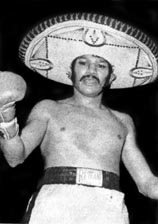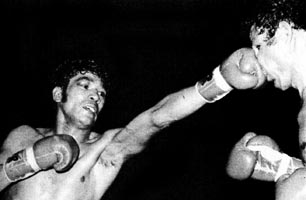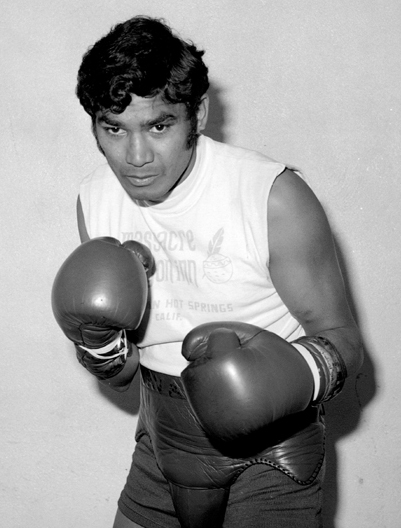JULY
2007
01 | The Life and Times of
a Boxing Pioneer
By Enrique
Encinosa
02 | Poem of the
Month
By Colleen Aycock
03 | In the Ring with James J. Corbett : Book Sample
By Adam Pollack
04 | My Candidate for
Manager of the Year: Cameron Dunkin
By Adam Pollack
05 | Touching
Gloves with Ruben Navarro
By
Dan Hanley
06 | Flashback
to the 2006 World Boxing Hall of Fame Banquet
By Dan Hanley
07 | Why the Old Soviet
Block of Nations is having Success in Boxing
By Rocky Alkazoff
08 | "I'm from Down-Under
too" Reflections from IBHOF 2007
By Orion Foote
09 | Prelims:the Art &
Science of Matchmaking [pdf]
By Don
Cogswell

10 |
Boxing's Lineal Mathematics : Champion Versus Champion
By
Cliff Rold
|

Touching Gloves with...Ruben Navarro
by
DAN HANLEY
Long before Spuds MacKenzie made the term popular, there was a party going on on the West
Coast. And at the center of this hedonistic soiree was the true original party animal who
carried the handle of "The Maravilla Kid." But the difference between Spuds and Ruben
Navarro was that Ruben could party and fight equally well. And woe to the man who told him
he couldn't.
DAN HANLEY: Ruben, tell me about your childhood.
RUBEN
NAVARRO: Well, I was born and raised in the Maravilla barrio of East L.A. My
parents were both from Mexico, and from June to December we would travel throughout
California, where we would pick fruit. It's funny, when I was little they used to have
this black woman watch me while they were in the orchards, and she was dressed just like
Aunt Jemima. You know, with the red bandanna, right off the syrup bottle. I was so dark
skinned they used to joke that I might really be hers, and they started calling me Jemima.
A nickname that's stuck my whole life.
Any history of boxing in the family?
None. When I was about 13, me
and some friends of mine were all high on pot, and we wandered into the Eastside Boys Club
in the barrio. There were a couple of guys sparring, and we were just laughing and having
a good old time, but one of the fighters took offense to it and said, "You think you could
do better?" And so, with a little coaxing, I laced up the gloves and got in the
ring.
How did you do?
According to my friends, I was dropped 55 times, but
got up 55 times before they told us to go on home. I was so mad I went home, got a
baseball bat, and went back to the club, but everyone had gone home. However, Marty
Denkin, who was running the club, told me to come back for proper instruction. I should
mention that the guy who worked me over was Joe Pimental, who went on to fight for the
world featherweight title and was the twin brother of "Little Poison" Pimental.
Did boxing just click with you?
Oh, I hated it at first. Marty had a
whole bunch of us on floor drills. Hour after hour of slipping and sliding and throwing
jabs in the air. No boxing. But Marty was teaching us fundamentals, which seems to be lost
today. After a few days of this, everyone dropped out, but I kept coming back.
[Laughs] There was nothing else to do.
How did you fare as an amateur?
I was really taking an interest in
the sport, comparing different styles, watching it on TV. My boxing hero was Gaspar
Ortega. I loved the way he would sit on the ropes and lure his opponent into him. I copied
that style and did quite well. Beginning with the Junior Golden Gloves, I won the
tournament every year from '59 through '64. And that's when things really heated up.
What happened?
This was the year of the Olympics. Now, I never liked
being told I couldn't do something. They'd tell me, "You can't lead with a right hand; it
isn't done!" But I'd learn to throw it and not get hit. They told me, "You're never going
to get out of the ghetto!" and sure enough, they tried to block me from the Western
Regional Trials. They didn't want some kid from the barrio involved. But Marty Denkin
wrote to every politician he could. I got the invite and won the Western Regionals.
So you competed in the '64 Olympic Trials?
There I was at the
World's Fair in New York, gloving up next to Buster Mathis and Joe Frazier. I may have lost in the
Trials, but I made it there.
Did you go pro after the Trials?
No, I came back and won the '65
Golden Gloves and was then drafted into the U.S. Army. I turned pro shortly after my
discharge.
Who did you go pro with?
I started out with Marty Denkin and over the
years was also managed by Howie Steindler, Johnny Flores, Harry Kabakoff and Rudy
Perez. I had to watch my managers. Early in my career I fought in Las Vegas, and after the
fight I asked my manager, "Where's my money?" And he said, "I left it on
the table." I'm looking around and I say, "What table?" He looks at me
with a grin and said, "The craps table." He'd lost the whole purse.
The beginning of your pro career was very strange. Your first 11 or so fights were
just preliminary club fights. I think maybe only two were even scheduled for 10. Then, in
the beginning of '68, you fought and beat Pete Gonzalez, Ray Adigun, and Hiroshi
Kobayashi. All Top 10 fighters. Kobayashi, the reigning 130-pound champion of the world.
In the span of three fights, with only 14 pro fights to your credit, you went from club
fighter to the No. 1 contender for the junior-lightweight title. I find this uncanny. Tell
me about these fights.Pete and Ray were good, especially Ray, who could
really hit. But we accepted the fight in Japan to fight Kobayashi, because they thought
I'd be an easy fight. I swear he was managed by Sony, because they had every camera
focused on me in the gym at all times. When the sparring partner they gave me began
reporting back that I was going to beat Kobayashi, they started playing games with me.
Can you explain?
Well, one night after dinner, I came back to my room
and they had a naked blonde waiting there for me in the room. Anything to break me down.
Now, this was not business. I was the one who was going to get hit in that ring, and I
threw her out. When the blonde didn't work, they said I couldn't use my protective cup.
They gave in when we said we were leaving. But you know, I was honored that they thought
so highly of me that they would pull these stunts. And they were right, because I beat him
good over 10 rounds. As a matter of fact, that last round was about a minute and a half
short.
You jumped in weight for your next big fight. Arturo Lomeli was a Top 10
lightweight at the time. Do you think it was a little too much too soon?
Well, I still think I should have got that decision, but I did beat him good in the
rematch.
You really had a hectic schedule. A month later you were back in Japan for a
10-rounder with former champ Yoshiaki Numata. Tell me about that fight.
Y'know, we tried to postpone that fight because I was sick, but they wouldn't let us. They
actually passed me in the pre-fight exam with a 102-degree fever. I beat him good but they
scored it a draw.
Your solid rating, and I suppose your record and appeal in the Orient, earned you
a shot at the vacant WBC junior-lightweight title. Tell me about your fight with Rene
Barrientos in Manila.
Actually there's not a lot to tell. I was in his
hometown and the promoter said to us, "If you want to win, we want half your contract."
Johnny Flores said, "No way!" I won 12 out of 15 rounds and they gave him the fight.
You were moving solidly now into the lightweight division and were on a tremendous
winning streak including a stoppage win over Jimmy Robertson. However, you were still
holding your rating at 130, and in July of '70, you got a chance at a title eliminator for
the junior-lightweight title. Tell me about your win over Raul Rojas.
I beat
him twice, actually.
Twice?!
I beat him soundly over 10-rounds, dropping him in the ninth
round. It was a unanimous decision, but he thought he was robbed and wouldn't let it go.
He came up to me later threatening to finish the fight. So...I beat him up in an alley
near Mando Ramos' house.
You're kidding?
Nope! He left the alley clutching his eye.
The ironic thing was that he got the title shot anyway.
Danny, the
politics of boxing is something else.
Who were you working with in the gym in those days?
Let's see...Jose
Napoles, "Indian Red" Lopez, Oscar Albarado, Zovek Barajas, Carlos Palomino...
 Ruben, those were all welterweights! Ruben, those were all welterweights!
Yeah, they liked using me for
speed and because I was slippery. Ernie Lopez hired me before his first fight with
Hedgemon Lewis, which he won, but didn't hire me for their second fight, which he lost. He
absolutely begged me to work with him for their third fight. I agreed and he won.
What were you making as a sparring partner?
[Laughs] Five
bucks a round. But I was staying sharp, too. I'll tell you a story. Roberto Duran came to
L.A. for a fight and came into the Main Street Gym one day with four sparring partners who
were all bandaged up. He was parading them around like trophies. He pleaded with me to
spar four rounds with him, saying that his sparring partners were useless. When the bell
rang ending the fourth round, he was raging because he never got to me, never really
catching me cleanly.
Aside from your elusiveness, you seemed to have a pretty decent jaw.
I was probably down about....five times my whole career. I'll tell you a funny story.
Angelo Dundee brought in Juan Collado from the Dominican Republic to fight me. Collado
dropped me in the first round, and the next thing I remembered was the referee saying,
"5," and me saying, "Hey, I'm on the floor!" I heard that Jim Healy, the TV commentator,
overheard Johnny Flores yelling to me, "Get up at 8!" and me responding, "Well, what time
is it now?" [Laughs] But I beat him over 10 rounds.
In February of '71, Mando Ramos was scheduled to fight Ken Buchanan for the
lightweight title in Los Angeles. I understand Ramos pulled out with a groin
injury?
Uhh....you could say that. He caught the clap!
You accepted the fight on 72 hours' notice. What kind of shape were you
in?
I had only just started training for a rematch with Jimmy Robertson when
we got the call, but I wasn't going to turn this down. The only thing I did for the next
three days was run, and my main concern was what kind of shape I would be in for the later
rounds.
Tell me about the fight.
Ken Buchanan was in tremendous shape, but I
dropped him in the first round, breaking his eardrum in the process, only for Arthur
Mercante to call it a slip. Mercante really seemed to be Buchanan's referee. In the
clinches, Mercante would separate us, but he'd bend my arm in a direction it wasn't
supposed to go. I actually took a bit of a swipe at him to let him know that he'd better
cut it out. Buchanan also brought an English judge with him, and they gave him the fight.
But I really believe I earned that decision.
Shortly after that, you took on a couple of your party buddies. Tell me about your
fights with Mando Ramos and Frankie Crawford.
Well, to tell you the truth,
yeah, we all drank, smoked pot, and did cocaine, but I only did it after a fight, whereas,
they were doing it all the time. I was very serious in training. As for the fight with
Frankie, we would all hype a fight, but he went a little too far. We'd play around, such
as I used to hold up my left hand to a guy's jaw when the press was around and tell him,
"This is going to make you sleep!" Then I'd hold up my right and say, "This is going to
make you snore!" Y'know, fun stuff. But he went around telling the press that I pulled a
knife on him and such. He really angered me for the fight and I gave him a good licking
for it. I was even warned by the referee for holding him up.
Your fight with Ramos generated a lot of press and a lot of hype. There was a line
attributed to you that stated, "Ahh, Mando's not in shape, he's been training in bars. I
know because I was with him!"
[Laughs] Yeah, Mando and I were always
going back and forth in the press. Once, I knocked out this club fighter, and Mando tells
the press, "Ahh, Ruben only fights hamburgers!" But then he signs to fight the very same
guy in his very next fight, so I tell the press, "Hey [Laughing], Mando's
stealing my hamburgers!"
Tell me about the fight.
Well, I was really up against it. I mean,
Mando was Aileen Eaton's boy, and he had already signed to fight Pedro Carrasco for the
title. But there is no way I lost that fight. I did have a measure of satisfaction
recently when I was inducted into the California Boxing Hall of Fame last summer. Ray
Ramos, Mando's dad, came up to me and said, "Between you and I, you beat the crap out of
my son that night."
You were on a nice winning streak and were being discussed as Roberto Duran's
possible first title defense when you took on Rodolfo Gonzalez in July of '72. Tell me
about this fight.
I was really angry that this fight took place at the Anaheim
Convention Center. It couldn't hold what the Forum could, and since we were fighting for a
piece of the gate, earnings were a lot less. As for the fight, let me tell you, everyone was afraid
of Rodolfo Gonzalez. He was an awesome mechanic and was a great champion but I
thought I did enough to win.
After that fight you switched management. You went with Harry Kabakoff. Why was
that?
A lot of funny stuff went on in choosing the Anaheim Convention Center
over the Forum. I mean, money under the table. I couldn't stay with Johnny Flores anymore.
I learned how to read contracts, something my managers didn't like. But I used to tell
them, "Hey, you work for me, I don't work for you!"
You began another winning streak, then got the call for your third title shot.
Again, against Rodolfo Gonzalez, this time for the WBC lightweight title. What happened in
this fight?
Before the fight, Harry Kabakoff told me he was going to make me
a "special meal," and Harry never made me a meal of any kind before. Well, he made me a
"special meal" all right, and I was food-poisoned. I had nothing at all in that fight.
 You retired and made a brief comeback. Was it just that it wasn't there
anymore?
You retired and made a brief comeback. Was it just that it wasn't there
anymore?I had become a Jehovah's Witness by that time and was reading the
Bible. I was a changed man. I had no fire, no aggression to go after my opponent. And
unless you have that fire, you aren't going anywhere. So, I packed it in.
Last question. How would you sum up your career?
A couple of years
ago I had the opportunity to meet my boxing idol, Gaspar Ortega, and I was surprised to
discover he knew who I was. I said to him, "Gaspar, I copied the way you would sit on the
ropes and lure your opponent into you." He looked at me funny and said, "Lure him in?
Ruben....I was tired, I was only resting." So, Danny, to answer your question,
[Laughing] it's a wonder I wasn't killed.
On February 22, 2007, Ruben and his wonderful wife, Carol, will be celebrating their 40th
wedding anniversary. Today, Carol and Ruben donate much of their time to working with the
deaf. Ruben is also the owner and operator of the Ruben Navarro Demolition Company. For a
man like Ruben, who made a career of dismantling his opponents, what an appropriate field
to get into.
See ya next round,
Dan Hanley
Dan Hanley is a CBZ staff writer. Contact him at
pugnut23@yahoo.com.
contents
|

